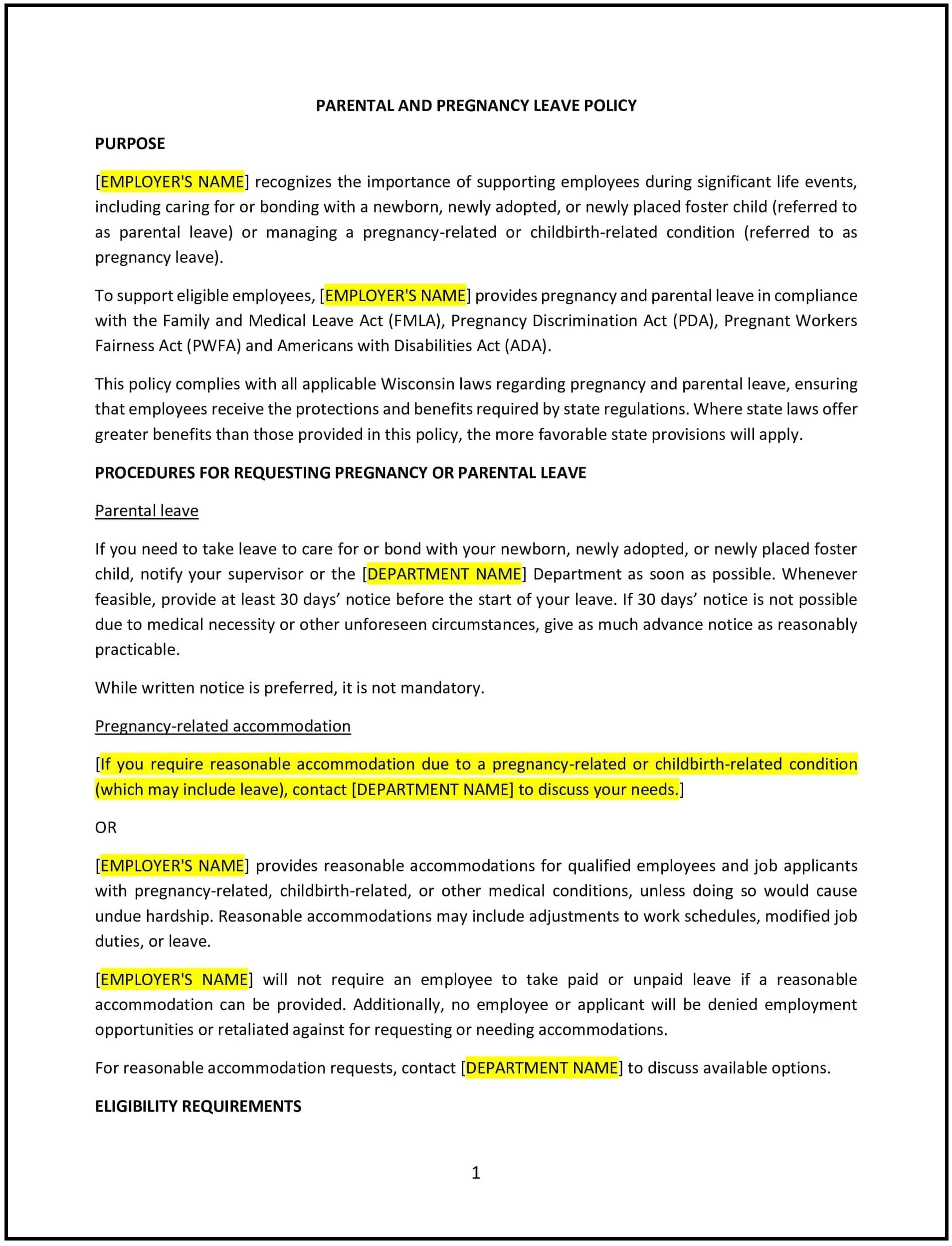Parental and pregnancy leave policy (Wisconsin): Free template
Got contracts to review? While you're here for policies, let Cobrief make contract review effortless—start your free review now.

Customize this template for free
Parental and pregnancy leave policy (Wisconsin)
A parental and pregnancy leave policy helps Wisconsin businesses support employees during pregnancy, childbirth, and the early stages of parenting by providing clear guidelines on leave entitlements, job protection, and benefits. This policy supports compliance with federal and state laws, such as the Family and Medical Leave Act (FMLA), while fostering an inclusive and supportive workplace.
By implementing this policy, businesses can create a more inclusive and family-friendly environment, reduce turnover, and enhance legal compliance with Wisconsin’s labor laws.
How to use this parental and pregnancy leave policy (Wisconsin)
- Define eligibility: Specify which employees are eligible for parental and pregnancy leave based on factors like tenure, full-time or part-time status, and other conditions outlined by state and federal law.
- Outline leave entitlements: Detail the amount of leave available to employees, including maternity leave, paternity leave, and adoption leave, and whether the leave is paid, unpaid, or partially paid.
- Address job protection: Ensure that employees are guaranteed job protection during their leave, meaning they can return to their original or an equivalent position after their leave.
- Clarify notification requirements: Provide guidelines for employees to notify the company in advance about their leave, including the timeline for providing notice and the necessary documentation (e.g., medical certificates).
- Include benefits continuation: Outline how employee benefits, such as health insurance, will be handled during the leave period, including whether the employee will continue to receive benefits during the leave.
- Maintain compliance: Make sure the policy is compliant with Wisconsin state laws and federal regulations, such as the FMLA, and regularly update the policy as laws evolve.
Benefits of using this parental and pregnancy leave policy (Wisconsin)
This policy offers several benefits for Wisconsin businesses:
- Promotes compliance: Aligns with federal and state laws regarding parental and pregnancy leave, reducing the risk of legal issues.
- Promotes work-life balance: Supports employees through major life events, promoting a healthier work-life balance and improving employee satisfaction and loyalty.
- Reduces turnover: Helps retain valuable employees by offering support during family leave, reducing the cost and impact of employee turnover.
- Fosters inclusivity: Demonstrates the company’s commitment to supporting diverse family structures, which can enhance company culture and attract top talent.
- Enhances productivity: Employees who feel supported during significant life events are more likely to return to work motivated, contributing to improved morale and long-term productivity.
Tips for using this parental and pregnancy leave policy (Wisconsin)
- Communicate the policy clearly: Ensure that all employees understand their rights and benefits under the policy, including how to apply for leave and the process for returning to work.
- Track leave usage: Implement a system for tracking parental and pregnancy leave requests to improve compliance with the policy and prevent potential conflicts or misunderstandings.
- Offer flexibility: Be flexible in accommodating employees' needs during this time, including offering part-time or phased return-to-work options where possible.
- Review regularly: Update the policy to reflect any changes in Wisconsin laws, the Family and Medical Leave Act (FMLA), or company practices regarding parental and pregnancy leave.
- Support returning employees: Provide resources and support to help employees transition back into the workplace after their leave, such as flexible schedules or temporary role adjustments if necessary.